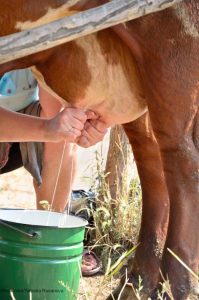Three recent raw milk E.coli outbreaks that sickened five children and one adult in the United Kingdom have prompted the Food Standards Agency (FSA) to issue a warning about unpasteurized milk. The agency has halted raw milk production at the farms and issued recalls.
 “Long standing FSA advice has been that vulnerable people – that’s older people, infants, children, pregnant women and those with weakened immune systems – are particularly vulnerable to food poisoning and that is why these groups should not be consuming raw drinking milk because it has not been heat treated. ” said Andrew Rhodes, Chief Operating Officer at the FSA.
“Long standing FSA advice has been that vulnerable people – that’s older people, infants, children, pregnant women and those with weakened immune systems – are particularly vulnerable to food poisoning and that is why these groups should not be consuming raw drinking milk because it has not been heat treated. ” said Andrew Rhodes, Chief Operating Officer at the FSA.In England, most milk is pasteurized, but raw milk sales are permitted if the labels bear a warning that the product is unpasteurized and could contain pathogenic bacteria. In Wales, raw milk must have an additional warning specifying risks to vulnerable groups. Raw milk is banned from sale in Scotland.
In the U.S., E. coli in raw milk sickened five Kentucky children in September, four of whom were hospitalized with hemolytic uremic syndrome (HUS), a life-threatening condition that develops in some young E.coli patients. That same month in Wisconsin, 38 members of a high school football team were sickened by raw milk contaminated with Campylobacter that a parent provided for at a banquet. The parent did not make it known that the milk was unpasteurized.
Because their immune systems are not fully developed, children and young people are especially vulnerable to viruses, parasites and dangerous bacteria such as Listeria, Campylobacter, Salmonella and E.coli found in raw milk. They are also at greater risk for developing HUS and other serious complications of food poisoning. For these reasons, that the American Academy of Pediatrics wants raw milk sales banned. They are joined by a host of medical, scientific and public health organizations including the U.S. Food and Drug Administration (FDA), the American Medical Association, the American Veterinary Medical Association, the International Association for Food Protection, the National Environmental Health Association, and the World Health Association in endorsing the consumption of pasteurized milk and milk products only for pregnant women, infants, and children.




